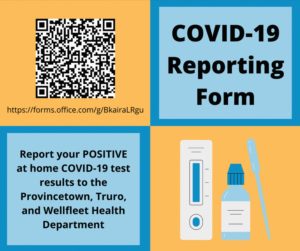WELLFLEET — The health agents in Provincetown, Truro, and Wellfleet have launched an online Covid-19 at-home test reporting tool that they hope can help solve a new gap in tracking coronavirus data and keeping the public informed.

The relative decline of PCR testing and medically supervised rapid testing, such as that performed at Outer Cape Health Services, means that the state’s official data on Covid are capturing a smaller and smaller percentage of tests and cases. At-home testing has become much more common, but positive results of at-home tests are not systematically reported to any government agency. The health agents created the self-reporting tool in hopes of keeping a better eye on the development of cases on the Outer Cape.
“We had a serious lack of surveillance — on the Outer Cape and everywhere — because of the increase in home testing and decrease in PCR testing,” said Hillary Greenberg-Lemos, Wellfleet’s health and conservation agent. “We wanted a tool that would give us a bit more surveillance, because one of the things that health departments are charged with is surveilling for disease.”
The nationwide shift to at-home testing came in response to the Omicron wave of the virus, which shattered case records last December, January, and February. Public testing sites across the country were overwhelmed with patients, and the Biden administration promoted at-home testing to help resolve the demand for tests. Free rapid tests are still available through the mail at covid.gov/tests.
The at-home tests helped solve the testing crisis but created a problem for disease tracking. Some jurisdictions have relied more heavily on wastewater testing for Covid, but nearly all of Cape Cod is served by septic systems rather than wastewater plants. The self-reporting tool could help close the knowledge gap.
“Without any type of surveillance, we don’t know what’s going on,” Greenberg-Lemos said. “This is a voluntary tool, and there is no regulatory requirement that folks fill it out — but it’s going to help us see what’s going on in our communities.”
The state’s weekly report of Covid cases comes out every Thursday and covers the previous two weeks. It includes only results from PCR testing. The June 23 report, which covers the period June 5 to 18, shows zero Covid cases in Provincetown and Truro, and “less than five” in Wellfleet.
The time period is not exactly comparable, but for the dates June 3 through 23 the self-reporting tool has received reports of three cases in Wellfleet, five in Truro, and one in Provincetown.
The tool will be especially important heading into the summer, Greenberg-Lemos said. “Because our population swells so much and we get such a major influx of visitors in the summertime, we wanted an easier way to see what was going on,” she said.
It is crucial that the tool be well publicized, Greenberg-Lemos added.
The tool originated in part with a suggestion from a Wellfleet citizen.
Lauren Kaufmann contacted Wellfleet Town Hall after she tested positive for Covid-19 on an at-home rapid test last month, only to find that the town was not collecting data from self-administered tests. “I realized that the numbers posted in the local papers are based only on PCR test results that are reported by Outer Cape Health Services or other clinics,” Kaufmann said.
Kaufmann encouraged the town to develop a Covid-19 self-reporting tool so that residents like her could anonymously report their results. She told the department about a similar tool used in Brookline, where she lives for part of the year.
“Communities need accurate data that reflect community spread so that they can adapt to surges and revise protocols as needed to keep people safe,” Kaufmann said. “I understand that all of us are experiencing some degree of Covid exhaustion. But the reality is, it’s still here, so we can’t just put blinders on and move into a state of denial.”
Meredith Ballinger, assistant health and conservation agent for Wellfleet, analyzed existing self-reported Covid-19 test result tools from Vermont, Brookline, and a county in California — some of the few places where self-reporting mechanisms exist — before developing the Outer Cape’s own version. All the tools had several things in common: they were simple, quick, and anonymous.
As of mid-June, there were no other self-reporting tools in use on the Cape or Islands, Ballinger said.
Kaufmann emphasized the importance of publicizing the tool. “It’s going to be key that they continually get the message across, because the population is ever-changing here in the summertime,” she said.
Ultimately, however, it is up to the public to report results. “It’s anonymous and voluntary, so a lot of this hinges on the public wanting to participate,” Greenberg-Lemos said.
Senior Reporter Paul Benson contributed to this article.



